A dedicated sponsor and a recycling brigade for each type of waste
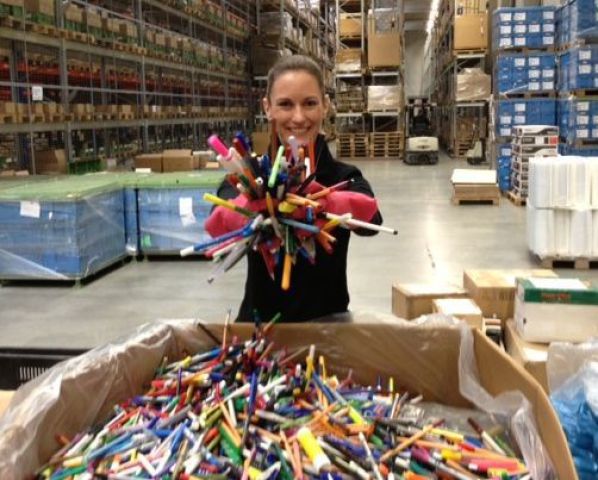
Is Terracycle a company or an NGO ?
Legally-speaking, it is a company. It was created by Tom Szaky, who came up with the idea of marketing an organic fertiliser made from worm castings during his studies at Princeton. From the start, he aimed to have his products packaged in bottles and jars recovered as part of the "Bottle Brigade" collection programme.
Once the fertiliser was reasonably successful in specialised outlets, TerraCycle developed its unconventional recycling activities by creating new "brigades" around the concept of "Sponsored waste".

How does it work ?
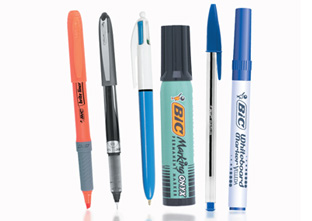 We partner with consumer brands whose products do not fit in with traditional recycling circuits, enabling them to sponsor and therefore finance the collection and recovery of the waste generated. For writing instruments, for instance, which are hard to recycle, we called on two industry heavyweights, Pic and Papermate, in order to set up a new recycling system.
We partner with consumer brands whose products do not fit in with traditional recycling circuits, enabling them to sponsor and therefore finance the collection and recovery of the waste generated. For writing instruments, for instance, which are hard to recycle, we called on two industry heavyweights, Pic and Papermate, in order to set up a new recycling system.
However, this "sponsoring" does not serve only to finance each new recycling system; it is part of a business model that also aims to reward environmentally-conscious consumers who have taken the time to collect the hard-to-recycle waste as part of our various programmes.
Collectors are also paid ?
 Not exactly. Terracycle uses their commitment to recycling; the company does not pay them in cash, but rather rewards them with points commensurate with the amount of waste they have collected.
Not exactly. Terracycle uses their commitment to recycling; the company does not pay them in cash, but rather rewards them with points commensurate with the amount of waste they have collected.
The collectors cannot purchase anything for themselves with the points; they are used to finance grants to Terracycle's many partner associations throughout the world.
In practice, if you agree to manage collection bins, which are generally simple boxes, and to ship them at Terracycle's expense, points will be credited to your online account once the bins are full. The points can then be converted to finance seawater sample analyses, or to purchase shrubbery in Haiti, or broiler chickens in Burkina Faso, bees in Morocco or even contribute to the maintenance of a classroom in Cambodia, etc.
What types of products and packaging are involved ?
The number and type of "brigades" vary from country to country and according to each country's consumer habits. In the United States, where the company was founded, there are 36 specific collection programmes for a wide variety of products ranging from tablets to smartphones, trainers and espresso capsules, sweet wrappers, cigarette butts, etc. In Europe, England has the greatest variety of "brigades". However, the volume of waste collected is often larger in the other countries.

When and why did you decide to create the "writing instruments brigade" ?
 The programme was launched in the United States in 2010, in partnership with Paper Mate. It was launched in the United Kingdom in late 2010, and in early 2011 in France, with the support of Bic. It has now been launched in 19 different European countries.
The programme was launched in the United States in 2010, in partnership with Paper Mate. It was launched in the United Kingdom in late 2010, and in early 2011 in France, with the support of Bic. It has now been launched in 19 different European countries.
Several factors contributed to bringing about the formation of this ’brigade’, namely the fact that such products were not being recycled at the time. However, we found that consumers, and particularly school-age children, are very interested in this issue. The industry's big manufacturers are also interested in the issue and have been very receptive to the solutions put forward by Terracycle's R&D department as a result. Once the recycling system becomes operational, the brands' images benefit from their participation in the scheme.
Does the writing instruments brigade only recycle products belonging to the partner brands ?
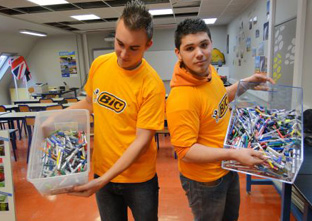 Some brigades work under an exclusive partnership aimed at recycling waste from a single brand. Generally, however, collections aimed at a category of products, such as writing instruments, take in all brands available on the market, under the umbrella of a single partner. In this particular case, Bic accepted to finance the creation of a waste recycling and processing system for the various ballpoint pens, felt-tip pens, mechanical pencils, highlighters, correctors and erasers used in Europe. The manufacturer also "sponsors" the waste from its competitors although it will be the sole party to benefit from the operation's media coverage.
Some brigades work under an exclusive partnership aimed at recycling waste from a single brand. Generally, however, collections aimed at a category of products, such as writing instruments, take in all brands available on the market, under the umbrella of a single partner. In this particular case, Bic accepted to finance the creation of a waste recycling and processing system for the various ballpoint pens, felt-tip pens, mechanical pencils, highlighters, correctors and erasers used in Europe. The manufacturer also "sponsors" the waste from its competitors although it will be the sole party to benefit from the operation's media coverage.
What challenges did you face in recycling these products ?
The main problem lies in the presence of various plastics and, sometimes, metals in small items whose average weight is estimated at 10g. The process that we developed separates the plastics from the metals during the initial sorting process. During the second step, which is the longest and the most complex, the three main polymers we are interested in are separated: polyethylene, polypropylene and polystyrene. They are then converted into pellets that are sold to plastics manufacturers or used in the manufacture of recycled plastic Bic products.
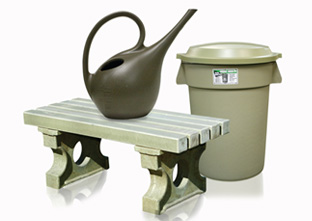
Who are the collectors involved in the "writing instruments brigade" ?
 In terms of numbers of participants, it is by far the most popular programme. Terracycle currently has 2,609 "recovery teams" in France, and 1,200 in the UK. Half of them are in schools, around 15% in companies and over a third in homes, but most often as part of a concerted effort. The teams are usually led by women between the ages of 25 and 50. It has to be noted that a network of the French "brigade's" size has three to five million collectors.
In terms of numbers of participants, it is by far the most popular programme. Terracycle currently has 2,609 "recovery teams" in France, and 1,200 in the UK. Half of them are in schools, around 15% in companies and over a third in homes, but most often as part of a concerted effort. The teams are usually led by women between the ages of 25 and 50. It has to be noted that a network of the French "brigade's" size has three to five million collectors.
How much waste are you able to recycle ?
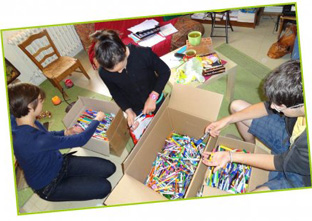 The scheme enables over eight million writing instruments, which account for approximately 80 tonnes of plastics, to be collected in Europe. The French "brigade" alone collects about 40% of that volume. The Netherlands, the UK and Spain follow closely behind, collecting around 46% of the materials to be recycled.
The scheme enables over eight million writing instruments, which account for approximately 80 tonnes of plastics, to be collected in Europe. The French "brigade" alone collects about 40% of that volume. The Netherlands, the UK and Spain follow closely behind, collecting around 46% of the materials to be recycled.
What are your goals ?
Given the programme's popularity and the lack of such schemes observed in certain European countries, I believe that it still has a lot of room for further development, particularly in Germany where we have less than 1,000 recovery teams. There is still a lot of work to be done.






